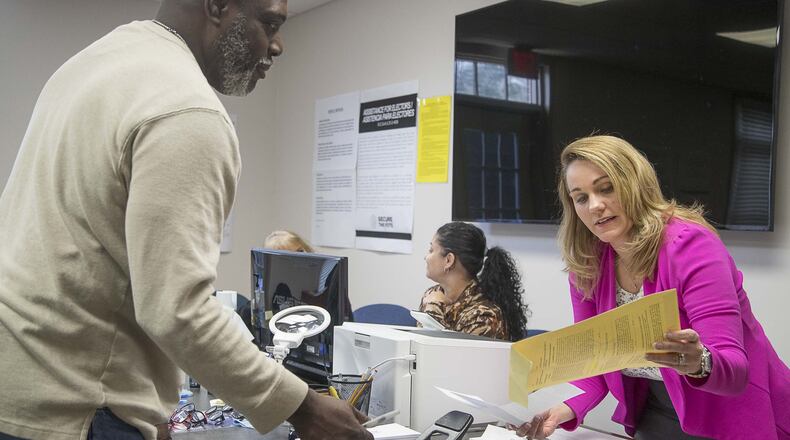The cost of a stamp to vote by mail in Georgia's primary has been criticized in a recent lawsuit as an unconstitutional poll tax and an obstacle to casting your ballot.
But postage to return absentee ballots isn’t truly required, no matter what voters have been told.
The U.S. Postal Service has a long-standing policy of delivering absentee ballots even if they lack sufficient postage, usually at least the cost of a 55-cent first-class stamp, depending on the weight of the ballot.
So while voters will be asked to pay for postage, they don’t really have to. It’s probably safer to add stamps, but mail carriers are told to deliver ballot envelopes labeled as “official election mail.”
Mailed-in ballots are expected to arrive in droves before the June 9 primary after Secretary of State Brad Raffensperger sent absentee ballot request forms to Georgia's 6.9 million active voters. They're being encouraged to vote from home and avoid human contact at the polls during the coronavirus pandemic.
The Postal Service still asks voters to attach proper postage. If they don’t, the Postal Service will deliver ballots and later bill county election offices.
“The Postal Service is steadfast in our commitment to support democracy,” spokesman Rick Badie said. “We will not exclude a voter’s right to vote by delaying a time-sensitive ballot because of insufficient postage.”
MORE: A map of coronavirus cases in Georgia
MORE: Real-time stats and the latest news on the coronavirus outbreak
The American Civil Liberties Union objects to the cost of postage, contending in a federal lawsuit filed last week that it's a poll tax banned by the U.S. Constitution's 24th Amendment, which prohibits the government from conditioning the right to vote on payment of a tax.
“No one should have to choose between protecting their health and their right to vote,” said Sophia Lin Lakin, deputy director for the ACLU’s Voting Rights Project. “Voting by mail will be the safest option for many voters. In failing to provide prepaid postage for absentee ballots, Georgia is creating an unconstitutional obstacle to voting.”
Poll taxes are illegal even if free alternatives exist, such as voting in person, according to the ACLU.
State law requires voting precincts to remain open on election day and during three weeks of early voting, which begins May 18.
Fair Fight Action, a voting rights group founded by Democrat Stacey Abrams, said the price of postage is an obstacle for voters who are afraid to leave their homes to buy stamps because they’re sick or at risk of contracting COVID-19.
“The state paying for return postage would make voting by mail more accessible, and it’s just common sense, especially during this pandemic,” Fair Fight Action spokesman Seth Bringman said.
If 3 million people vote absentee in Georgia’s primary, at a cost of 55 cents per ballot in prepaid postage, it would cost the government at least $1.65 million.
The secretary of state’s office declined to comment.
Georgia has allowed anyone to vote absentee without an excuse since 2005, and about 5% of voters usually mail their ballots. Far more people are expected to vote absentee during this spring’s coronavirus-tinged primary.
Absentee ballots will begin arriving in voters’ mailboxes next week. Absentee ballot request forms can be returned by mail, or they can be photographed and emailed at no cost to county election offices. The Postal Service didn’t answer questions about whether it would deliver absentee request forms without postage.
Though county governments and their taxpayers will have to reimburse the Postal Service for unstamped ballots, local governments saved money when the secretary of state’s office paid for upfront costs normally borne by counties. The state government paid over $3 million to print and mail absentee ballot request forms, in addition to the cost of packaging and mailing ballots themselves, between $1.88 and $2.38 per ballot, depending on their size.
“Elections aren’t free and there are going to be costs entailed,” said Todd Edwards of the Association County Commissioners of Georgia, which advocates for county governments. “It could have been worse if we were forced to send out these ballots to begin with.”
County election officials said voters won’t be turned away over the price of a stamp.
“You should not be concerned about the cost of postage,” said Mike Kaplan, the nonpartisan chairman for the Macon Board of Elections. “The cost of postage should not deter you from voting. That’s what people need to understand.”
Check your absentee ballot status
Georgia voters can check whether their absentee ballot request forms and ballots have been received by election officials online at the state's My Voter Page at www.mvp.sos.ga.gov.
The website shows the date absentee ballot requests were received and their status.
Absentee ballots will begin to be mailed to voters the week of April 20. They will be counted if received by county election officials by 7 p.m. on election day June 9.
About the Author
Keep Reading
The Latest
Featured




